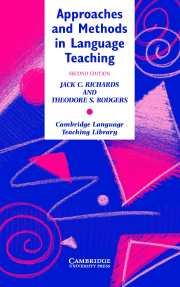Book contents
- Frontmatter
- Contents
- Preface
- Part I Major language trends in twentieth-century language teaching
- Part II Alternative approaches and methods
- 5 Total Physical Response
- 6 The Silent Way
- 7 Community Language Learning
- 8 Suggestopedia
- 9 Whole Language
- 10 Multiple Intelligences
- 11 Neurolinguistic Programming
- 12 The lexical approach
- 13 Competency-Based Language Teaching
- Part III Current communicative approaches
- Author index
- Subject index
12 - The lexical approach
Published online by Cambridge University Press: 06 July 2010
- Frontmatter
- Contents
- Preface
- Part I Major language trends in twentieth-century language teaching
- Part II Alternative approaches and methods
- 5 Total Physical Response
- 6 The Silent Way
- 7 Community Language Learning
- 8 Suggestopedia
- 9 Whole Language
- 10 Multiple Intelligences
- 11 Neurolinguistic Programming
- 12 The lexical approach
- 13 Competency-Based Language Teaching
- Part III Current communicative approaches
- Author index
- Subject index
Summary
Background
We have seen throughout this book that central to an approach or method in language teaching is a view of the nature of language, and this shapes teaching goals, the type of syllabus that is adopted, and the emphasis given in classroom teaching. A lexical approach in language teaching refers to one derived from the belief that the building blocks of language learning and communication are not grammar, functions, notions, or some other unit of planning and teaching but lexis, that is, words and word combinations. Lexical approaches in language teaching reflect a belief in the centrality of the lexicon to language structure, second language learning, and language use, and in particular to multiword lexical units or “chunks” that are learned and used as single items. Linguistic theory has also recognized a more central role for vocabulary in linguistic description. Formal transformational/generative linguistics, which previously took syntax as the primary focus, now gives more central attention to the lexicon and how the lexicon is formatted, coded, and organized. Chomsky, the father of contemporary studies in syntax, has recently adopted a “lexicon-is-prime” position in his Minimalist Linguistic theory.
The role of lexical units has been stressed in both first and second language acquisition research. These have been referred to by many different labels, including “holophrases” (Corder 1973), “prefabricated patterns” (Hakuta 1974), “gambits” (Keller 1979), “speech formulae” (Peters 1983), and “lexicalized stems” (Pawley and Syder 1983). Several approaches to language learning have been proposed that view vocabulary and lexical units as central in learning and teaching.
- Type
- Chapter
- Information
- Approaches and Methods in Language Teaching , pp. 132 - 140Publisher: Cambridge University PressPrint publication year: 2001



